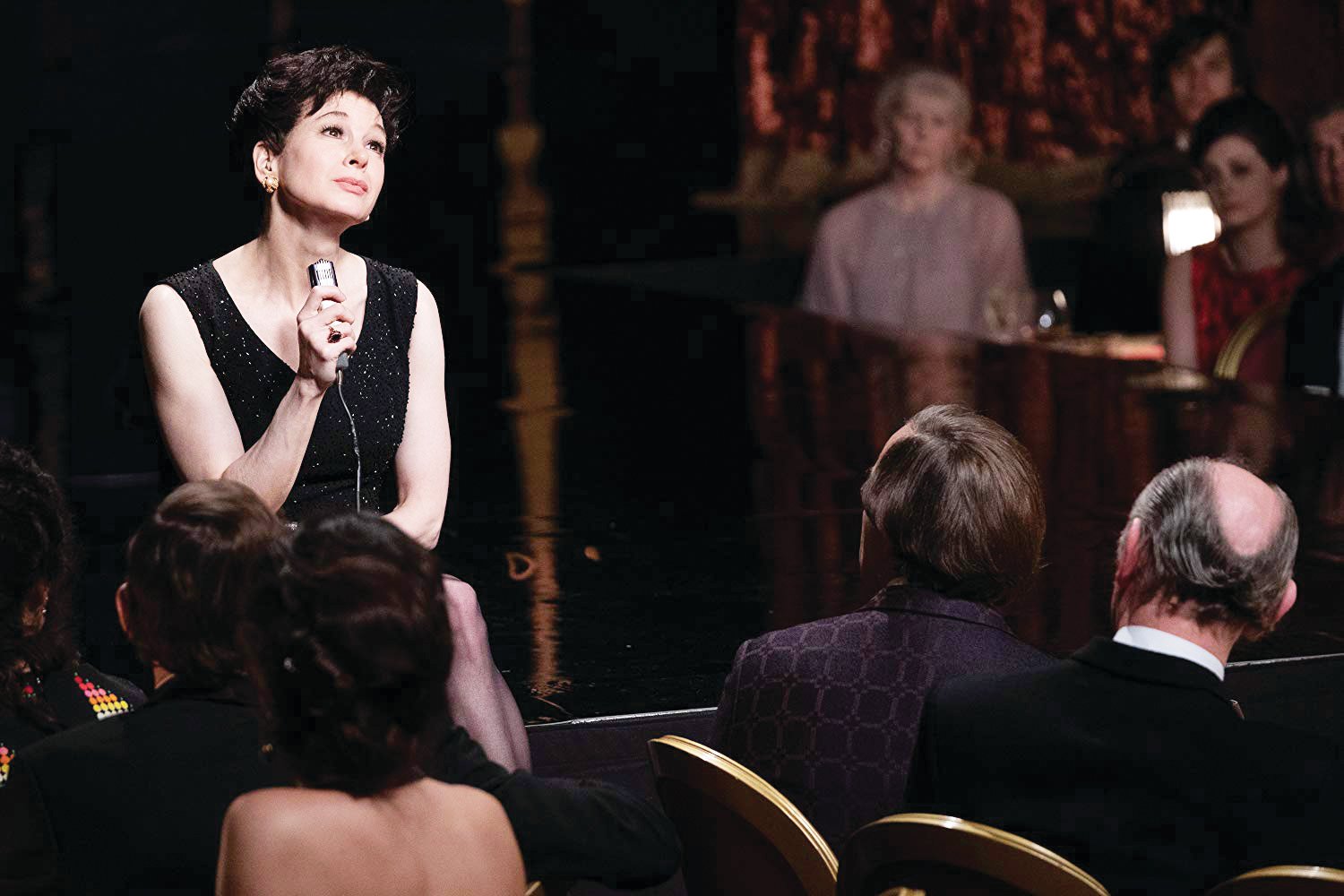
With the biopic being one of the surest vehicles for an acting Oscar, Renée Zellweger takes the fast lane with her portrayal of a latter-days Judy Garland in the eponymous “Judy.”
Already an idiosyncratic actor, Zellweger applies her trademark twitchiness to an eccentric Garland when she was just 46 years old but with mere months to live. Zellweger squints, puckers and otherwise vamps her way through a booze-and-barbiturates-fueled Garland, channeling the hollowed out husk of an erstwhile starlet who chooses slavish stardom over independent anonymity in the film’s opening scene, a flashback to a 17-year-old Garland (played by Darci Shaw) and film producer Louis B. Mayer on the set of “The Wizard of Oz.” It’s a Faustian bargain that gave Garland the adoration she (and her domineering mother) desired, but at the expense of everything else.
Broke, homeless, ostracized, and on the verge of losing custody of her two young children with ex-husband Syd Luft (Rufus Sewell), Garland departs America in early 1969 for the only well-paying gig she can find — a five-week concert run at The Talk of the Town nightclub in London. Mercurial and jonesing, Garland eschews rehearsal and nearly misses opening night. Held together by a sequined dress and pancake makeup, Garland is basically shoved on stage...and proceeds to electrify the crowd with a showstopping rendition of “By Myself.” She’s wide-eyed and almost manic, as if taken over by the celebrity symbiote that long since subsumed her soul.
The why of “Judy” is mainly found during those periodic flashbacks, in which Mayer and his tyrannical handlers deprive young Garland of French fries and free time, instead plying her full of pills to keep her thin and awake. Her birthday becomes a weeks-removed publicity reel, a fake party complete with a cake she can’t eat and a pool in which she can’t swim. Garland’s life as the née Frances Gumm is forfeit to the stage name for a girl Mayer repeatedly reminds her isn’t nearly as pretty as many aspirants living in middle America. But Judy Garland has the voice of an angel, even if it’s in service to the devilish Mayer, cast as manipulative and abusive.
The what of “Judy” is Zellweger’s tragic turn, laced with just enough wit to keep Garland likeable despite her occasional unprofessional spasms. She spurs standing ovations one night, then elicits heckles and thrown bread rolls the next, much of the frustration of club owner Bernard Delfont (Michael Gambon) and Garland’s personal assistant Rosalyn (Jessie Buckley). Dark clouds temporarily part with the arrival of Mickey Deans (Finn Wittrock), a fledgling American singer who woos Garland and becomes her fifth and final husband. But her downslide is already too precipitous.
The screenplay, written by “The Crown” scribe Tom Edge, is adapted from the Tony-nominated play “End of the Rainbow.” Despite Zellweger’s tour de force and Garland’s tantalizing tragic arc, the script isn’t terribly imaginative, resting mainly on the able shoulders of its headliner. As such, nearly all the supporting characters are half-written or fade into the background. Gambon is given little to do besides mug for the camera, while director Rupert Goold never seems to figure out whether to portray Rosalyn as friend, foe, both, or neither. Wittrock’s Mickey exudes a sufficient amount smarmy adoration, but his motives also remain obviously pat. Garland’s London bandleader (Royce Pierrson) is just there, as are two fictitious gay fans Garland befriends after one night’s concert, apparently inserted as proxies for Garland’s iconic status in the gay community.
As a result, the film lumbers along during its latter stages, seemingly necessitating a heart-wrenching denouement that quickly slides into a mawkish audience singalong. Like Garland’s career, “Judy” is blessed with a talented star and starts out with much promise, only to become more uneven and unfulfilling towards its end.